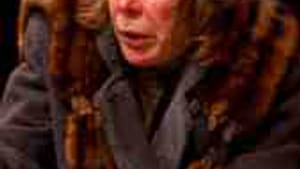Stay in the Loop
BSR publishes on a weekly schedule, with an email newsletter every Wednesday and Thursday morning. There’s no paywall, and subscribing is always free.
Uplift vs. apathy in the Windy City
Tracy Letts's "Superior Donuts' at the Arden (3rd review)

Chicago, Carl Sandberg's "City of Big Shoulders" is the backdrop for this Tracy Letts play about the lost in spirit and the hand that lifted him up.
Not by happenstance has Letts placed his story in Uptown (roughly Chicago's equivalent of Philadelphia's Fishtown). It would be hard to spin this kind of tale in any setting other than the Windy City.
First we have the pot-smoking protagonist, Arthur Przbyszewski, played so mellow by Craig Spindle that at times you forget he's on stage. Art's character and background could hardly be placed in New Orleans or Los Angeles. He's Slavic to the core, having once fled Chicago to Canada in order to escape both his immigrant father's constraints and the Vietnam War draft. Yet Art returned home to wallow in the heritage he denied.
Next we have the Depression-era donut shop that Art's father bought in 1950. Right away you sense that Art is the victim of a sad Polish curse. The store (as designed by Kevin Depinet) looks abandoned, and Art's steady clientele consists of two cops (a tough Irish-American woman with a heart of gold, played by Jennifer Barnhart, and a black man played with a commanding presence by Brian Anthony Wilson), an old drunk named Lady Boyle (whose interpretation by Nancy Boykin steals every scene she's in) and Art's Russian immigrant shop owner neighbor, Max (David Mackay).
Max likes Art, but mainly he visits to make a pest of himself by constantly offering to buy Art's store. The drunken Lady Boyle comes in for her free donuts; and the cops are there— well, because they're cops.
Absentee proprietor
As the play opens, Art's shop has been vandalized by unknown forces. Max noticed the open door and alerted the two cops, who should have noticed the scene long before Max did. No one knows where Art is because Art doesn't always rise to make the donuts.
When Art finally arrives at his ramshackle shop, he takes no notice of the graffiti on the door or the busted chairs; he's more concerned that he's out of coffee. Officer Bradley, the black cop who likes to go to Star Wars conventions, fetches everyone some Starbucks (the neighborhood is gentrifying) while his female partner makes googly eyes at Art.
The stage is placed on the ground level, so the audience views the action like spectators at a golf match: You feel you're a fly on a dirty wall in Art's donut shop. Since the tempo, as directed by Edward Sobel, is so low-key, it's a perfect device.
Redemption knocks
After refusing to assist the police, Art is left along with his donuts and his stash of pot. But redemption comes a knocking in the form of a local adolescent, Franco Wicks, who needs a job.
Franco (James Ijames) is annoying, pushy and in a hurry for minimum-wage work (for a reason we find out later), but he manages to give Art something he has lacked for a long time: life.
Of course such a sensitive kid harbors higher ambitions. But as a product of the streets, Franco has payments due.
Great fight choreography
Pete Pryor and Jake Blough as the local mob enforcers, along with Ian Bedford, as Max's nephew, give us one of the best choreographed fight scenes on a local stage this season. (Kudos to fight director John V. Bellomo.) But most of the praise belongs to Art, who, years after evading the military, finally realizes there are values worth fighting for.
The end of this bittersweet saga is simultaneously uplifting and discouraging. But hey, "It's Chicago".♦
To read another review by Marshall A. Ledger, click here.
To read another review by Steve Cohen, click here.
To read another review by Jane Biberman, click here.
Not by happenstance has Letts placed his story in Uptown (roughly Chicago's equivalent of Philadelphia's Fishtown). It would be hard to spin this kind of tale in any setting other than the Windy City.
First we have the pot-smoking protagonist, Arthur Przbyszewski, played so mellow by Craig Spindle that at times you forget he's on stage. Art's character and background could hardly be placed in New Orleans or Los Angeles. He's Slavic to the core, having once fled Chicago to Canada in order to escape both his immigrant father's constraints and the Vietnam War draft. Yet Art returned home to wallow in the heritage he denied.
Next we have the Depression-era donut shop that Art's father bought in 1950. Right away you sense that Art is the victim of a sad Polish curse. The store (as designed by Kevin Depinet) looks abandoned, and Art's steady clientele consists of two cops (a tough Irish-American woman with a heart of gold, played by Jennifer Barnhart, and a black man played with a commanding presence by Brian Anthony Wilson), an old drunk named Lady Boyle (whose interpretation by Nancy Boykin steals every scene she's in) and Art's Russian immigrant shop owner neighbor, Max (David Mackay).
Max likes Art, but mainly he visits to make a pest of himself by constantly offering to buy Art's store. The drunken Lady Boyle comes in for her free donuts; and the cops are there— well, because they're cops.
Absentee proprietor
As the play opens, Art's shop has been vandalized by unknown forces. Max noticed the open door and alerted the two cops, who should have noticed the scene long before Max did. No one knows where Art is because Art doesn't always rise to make the donuts.
When Art finally arrives at his ramshackle shop, he takes no notice of the graffiti on the door or the busted chairs; he's more concerned that he's out of coffee. Officer Bradley, the black cop who likes to go to Star Wars conventions, fetches everyone some Starbucks (the neighborhood is gentrifying) while his female partner makes googly eyes at Art.
The stage is placed on the ground level, so the audience views the action like spectators at a golf match: You feel you're a fly on a dirty wall in Art's donut shop. Since the tempo, as directed by Edward Sobel, is so low-key, it's a perfect device.
Redemption knocks
After refusing to assist the police, Art is left along with his donuts and his stash of pot. But redemption comes a knocking in the form of a local adolescent, Franco Wicks, who needs a job.
Franco (James Ijames) is annoying, pushy and in a hurry for minimum-wage work (for a reason we find out later), but he manages to give Art something he has lacked for a long time: life.
Of course such a sensitive kid harbors higher ambitions. But as a product of the streets, Franco has payments due.
Great fight choreography
Pete Pryor and Jake Blough as the local mob enforcers, along with Ian Bedford, as Max's nephew, give us one of the best choreographed fight scenes on a local stage this season. (Kudos to fight director John V. Bellomo.) But most of the praise belongs to Art, who, years after evading the military, finally realizes there are values worth fighting for.
The end of this bittersweet saga is simultaneously uplifting and discouraging. But hey, "It's Chicago".♦
To read another review by Marshall A. Ledger, click here.
To read another review by Steve Cohen, click here.
To read another review by Jane Biberman, click here.
What, When, Where
Superior Donuts. By Tracy Letts; Edward Sobel directed. Through April 3, 2011 at the Arden Theatre, F. Otto Haas Stage, 40 N. Second St. (215) 922-1122 or www.ardentheatre.org.
Sign up for our newsletter
All of the week's new articles, all in one place. Sign up for the free weekly BSR newsletters, and don't miss a conversation.

 Jackie Schifalacqua
Jackie Schifalacqua